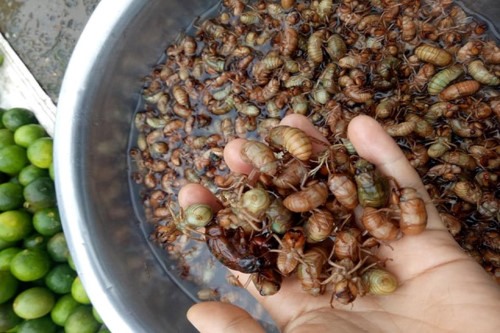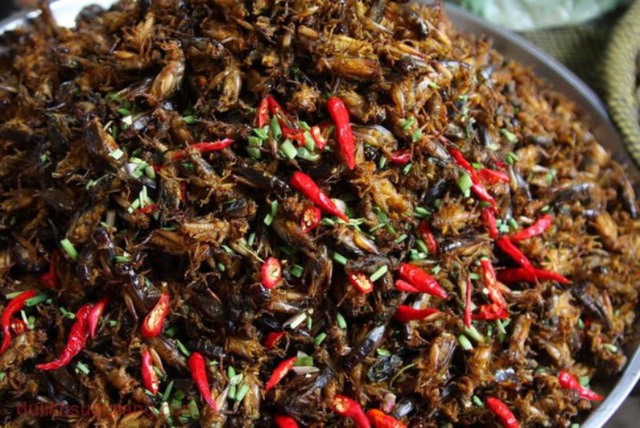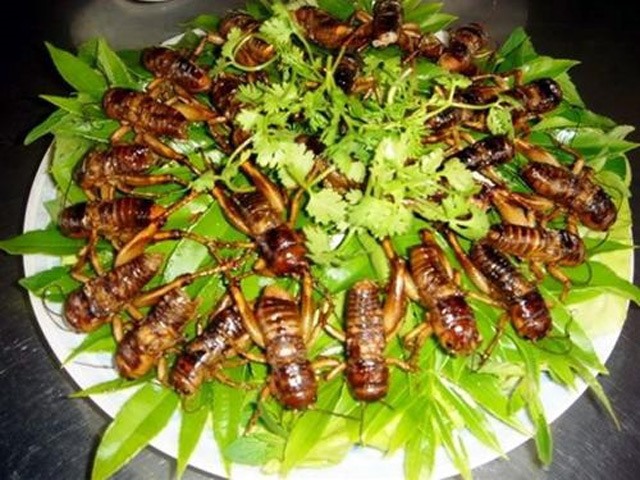Viet Nam News
By Duy An
It’s not just the nature and diverse culture that makes Son La Province so special.
There are many traits of Viet Nam’s northwestern region that ensure visitors never forget their time spent there.
And one of those is a popular meal.
Originating in the ethnic region of Thai, milk cicada fried with sour fresh bamboo and roasted cricket may not be to everyone’s taste.
But for the locals here, it is a meal that makes them proud.
House-wife La Thi Hien recently invited us to her home in Son La where we were treated with these delicacies.
 |
| Wash up: Young cicadas should be carefully cleaned before cooking. |
Hien said to collect fat milk cicadas, her husband and she have to wait for the evening when the young insects creep up to the land surface, their bodies and wings still soft leaving them unable to fly.
“It is very easy to catch them and then put them into a light salted bottle,” she said, noting the best places to catch them were around old trees and wet areas.
The young cicada is only about the size of the tip of your little finger with a round body and brown or light green colours.
“Both of us can catch as more than a kilos of the cicadas each evening. I soak them in salted water for an hour and then wash before cooking,” Hien said.
Spices for the dish include sour young bamboo water, chili, citronella, lemon leaves cut into threads and several spoonful of pork fat or cooking oil.
The secret to the right taste is all in the bamboo water.
 |
| Big hit: A tasty and delicious roasted crickets that could make your mouth watering. |
It is also important to fry a dried onion in fat and then put the materials into the pan, Thai people put the washed cicadas into the pan and pour the sour bamboo water in and then cook them over light fire until the pan is dried.
“This way helps to eliminate bad odour from the cicadas to ensure this is the right time to fry them with fat, fish sauce and chili until they turn to red brown colour in order to keep young milk in the cicada’s belly, and help the food more greasy without being too dried.
After frying, the cicadas should be quickly poured onto a large plate and then sprinkled with lemon threads.
“The food should be eaten when hot to experience its crispy, greasy and aromatic mixed fragrant of sour bamboo water and lemon,” Hien’s husband Nong Ich Lai told us.
What I like most is the unmistakable taste of the mixed citronella, lemon and sour bamboo water.
Next course was the roasted crickets.
As the plate was put in front of us, we were unaware of the time and effort needed to prepare such a meal.
Catching the insect may not be difficult but because they are in short supply, many Thai people have resorted to raising the crickets at home.
And as if often the case, those caught in the world are far superior to those raised in captivity.
 |
| Nice with wine: Red brown roasted crickets are ready for wine sippers. |
Lai said: “Compared with raised crickets, those from nature are much more tasty and delicious.”
Hien’s own dipping sauce, made from a heady mix of minced garlic, citronella, chili, MSG, sugar, fish sauce and chutneys is more tasty.
“If you wish a stronger flavour you should pour chutneys or sour fresh bamboo water on the roast cricket. The dish is often eaten with green mango, cucumber or qua coc (ambarella),” said Hien
First my two maternal grandchildren were afraid of the crickets but after a try, they seemed to forget their scar and were very interested in the dish later.
Lai said the dish is very suitable for sipping a cup of wine with close friends like us.
Local herbalist Lo Van Son to us that according to traditional medicine, crickets contains high protein.
“I often use crickets as one of remedies to treat diuretic, and oedema. Eating crickets particularly helps to reduce bad cholesterol and renal calculus.”
Foreign research also shows that apart from enriched with protein and less fat, crickets also have high calcium, kali, manganese, acid folic and vitamins that needed for human being and their brain. — VNS